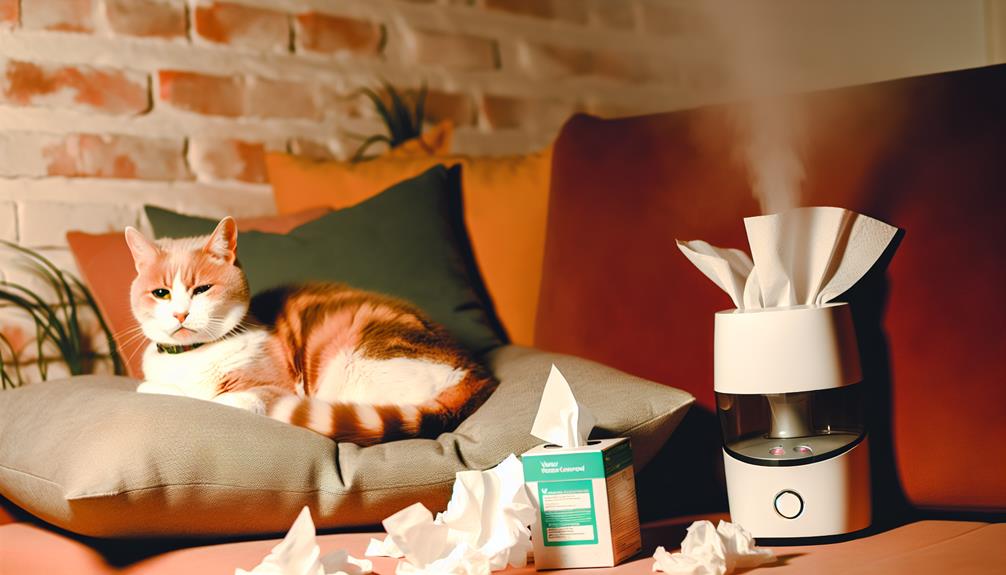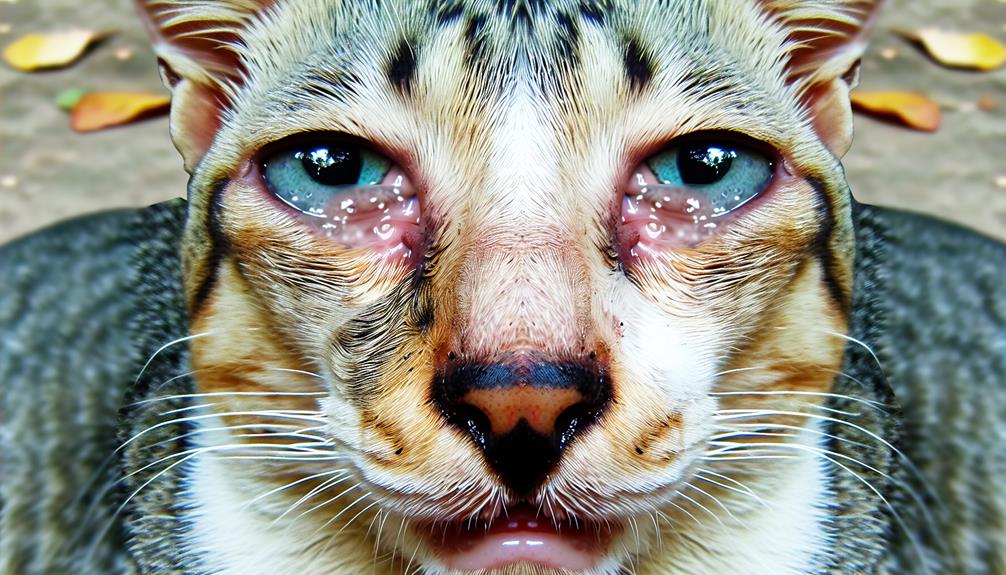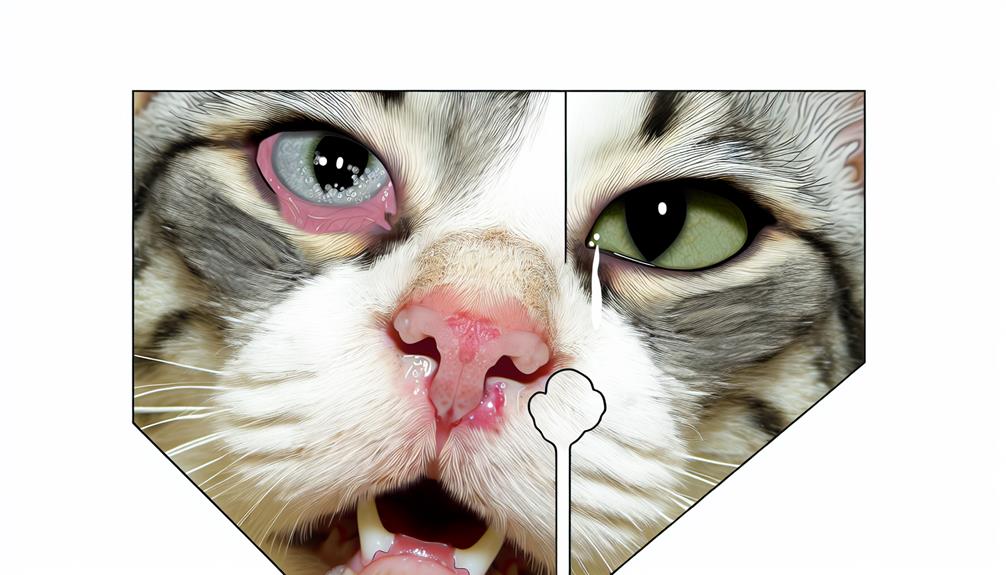Do you love cats but suffer from allergies? It can be really frustrating when you have itchy eyes and a runny nose every time you're around these adorable furry creatures. But don't worry, there are natural solutions that can help bring you relief! Instead of relying on medications, you can explore the world of natural remedies for cat allergies. In this discussion, we'll learn about different ways to soothe irritation and even prevent future allergy episodes. Whether you own a cat or just love them, this information will give you valuable insights and potential relief. Let's dive in!
Key Takeaways
Key Takeaways:
- Natural remedies like herbal supplements, regular grooming, and a clean environment can help soothe cat allergies and itching.
- Understanding the symptoms and taking preventive measures are crucial in managing allergies.
- Minimizing exposure to allergens and maintaining good hygiene can prevent future allergy episodes.
- Trying these natural solutions can provide relief and improve the well-being of both you and your furry friend.
Understanding Cat Allergies
Why Do Some People Get Allergic Reactions to Cats?
Have you ever wondered why some people sneeze and get itchy eyes around cats? Well, it turns out that these people have something called cat allergies. But what exactly causes these allergies? Let's find out!
- Cat Allergies: Cat allergies happen when a person's immune system overreacts to certain proteins found in a cat's saliva, urine, and dander.
- Mistaken Identity: When someone with a cat allergy comes into contact with these proteins, their immune system gets confused and thinks they are harmful invaders. To protect the body, the immune system releases chemicals like histamine, which leads to allergy symptoms.
So, now that we know what causes cat allergies, how can we manage them?
Preventing Cat Allergies:
- Limit Exposure: One way to manage cat allergies is to minimize exposure to allergens. Here's how you can do it:
- Keep cats out of certain areas of the home where you spend a lot of time.
- Use special bedding and covers that are designed to block allergens.
- Regularly clean and vacuum the house to remove allergens like cat hair and dander.
- Good Hygiene: Practicing good hygiene can also help reduce the risk of allergic reactions. Remember to:
- Wash your hands after touching cats.
- Avoid touching your face, especially your eyes, after touching cats.
Treating Cat Allergies:
- Antihistamines: Over-the-counter or prescription antihistamines can help relieve allergy symptoms like sneezing, itching, and watery eyes.
- Nasal Sprays and Eye Drops: These can provide temporary relief from congestion and itchy eyes.
- Allergy Shots: In more severe cases, a doctor may recommend allergen immunotherapy, also known as allergy shots. These shots help the immune system become less sensitive to cat allergens over time.
Understanding and managing cat allergies can make a big difference in the lives of people who are allergic to cats. By taking steps to prevent exposure and using appropriate treatments, they can enjoy a more comfortable and symptom-free life.
Identifying Common Allergy Symptoms
What are the signs of a cat allergy? Let's find out together! If you've ever wondered if you're allergic to cats, keep reading because we're going to talk about the common symptoms. By knowing these symptoms, you can better manage your cat allergies. Here are four things to look out for:
- Sneezing and Runny Nose: Do you find yourself sneezing a lot around cats? If so, it could be a sign of a cat allergy. Your body's immune system might be overreacting to the allergens found in cat dander or saliva. This can also lead to a runny or stuffy nose.
- Itchy, Watery Eyes: Have you ever noticed your eyes getting itchy, red, or watery when you're around cats? That's another common symptom of a cat allergy. It can be really annoying and make it hard to see clearly.
- Skin Rash or Hives: Some people may develop a rash or hives after coming into contact with cat allergens. These can show up as red, itchy patches on your skin. It's important not to scratch them because it can make them worse.
- Difficulty Breathing: In more severe cases, cat allergies can make it hard to breathe. You might experience wheezing, chest tightness, or difficulty taking deep breaths. If you ever have trouble breathing, it's important to get help right away.
So, how can you manage your cat allergies? Well, it's all about avoiding the things that trigger your allergies. For example, try to stay away from cat dander and saliva as much as possible. You might also need to use medications like antihistamines or nasal sprays to help with your symptoms.
Now you know some common allergy symptoms to look out for if you think you might have a cat allergy. Remember to take care of yourself and find ways to manage your allergies so you can enjoy your time with cats without any discomfort.
Natural Remedies for Cat Allergies
Discover Natural Remedies for Cat Allergies!
Do you suffer from cat allergies? Don't worry, there are natural remedies that can help! Instead of relying on traditional medications, you can try herbal supplements and homeopathic treatments. Let's explore some options together:
- Herbal Supplements:
- Butterbur: This ancient herb has shown great promise in reducing nasal congestion and itching.
- Stinging Nettle: With its anti-inflammatory properties, stinging nettle can help alleviate allergic reactions.
- Quercetin: Found in fruits and vegetables, quercetin inhibits the release of histamine, which causes allergy symptoms.
- Homeopathic Treatments:
- Allium Cepa: This remedy can relieve watery eyes and sneezing.
- Euphrasia: Known for its ability to soothe eye irritation, Euphrasia is helpful for cat allergy sufferers.
It's important to note that the effectiveness of these remedies may vary from person to person. Before trying anything new, it's always a good idea to consult with a healthcare professional.
Soothing Itching and Irritation
How to Soothe Itchy Skin from Cat Allergies
Did you know that cat allergies can cause itchy skin and irritation? But don't worry, we've got some great tips to help you feel better! Check out these simple and natural techniques:
- Use a special cream: Look for creams or ointments with ingredients like chamomile, aloe vera, or calendula. These can help reduce itching and redness.
- Try a cold compress: If you're feeling itchy, grab a cold washcloth and place it on the itchy spots. The coolness can numb your skin and make it feel better.
- Take an oatmeal bath: Adding oatmeal to your warm bath can work wonders. Oatmeal has special properties that can calm allergic reactions and soothe irritated skin.
- Relax and reduce stress: Did you know that stress can make itching worse? Try some relaxation techniques like deep breathing exercises, meditation, or even yoga. They can help reduce stress and make you feel more comfortable.
Preventing Future Allergy Episodes
How to Prevent Allergy Episodes from Cats
Do you love cats but hate the sneezing and itching that comes with allergies? Well, we've got some tips to help you prevent those allergy episodes and enjoy your feline friends without all the discomfort. Check out these simple strategies for creating an allergy-free environment:
- Keep the Air Fresh and Clean:
- Open your windows and use fans to improve air circulation and reduce allergen buildup.
- Use air purifiers with HEPA filters to remove cat dander and other allergens from the air.
- Clean Regularly:
- Vacuum your carpets, upholstery, and curtains with a vacuum cleaner that has a HEPA filter to get rid of cat hair and dander.
- Wash your bedding, including your pet's bedding, frequently to eliminate allergens.
- Create Cat-Free Zones:
- Designate specific rooms or areas in your home where your cat is not allowed. This gives you a safe space to retreat to when allergies flare up.
- Groom Your Cat:
- Regularly brush your cat's fur to remove loose hair and dander, reducing the amount of allergens in your home.
Frequently Asked Questions
Can Cat Allergies Develop Later in Life?
Frequently Asked Questions (FAQs):
Q: Can you develop cat allergies later in life?
A: Yes, it's possible to develop cat allergies as you get older. Some things that can increase the chances of developing allergies include having family members with allergies, being exposed to cats, and having other allergies. If you are around cats a lot, your symptoms might get worse over time.
Q: What are the signs of cat allergies?
A: Signs of cat allergies can vary, but some common ones include sneezing, a runny or stuffy nose, itchy or watery eyes, and coughing. Some people may also experience skin rashes or asthma symptoms like difficulty breathing.
Q: Why do cat allergies get worse with repeated exposure?
A: When you're exposed to cat allergens (tiny particles that can cause allergies), your immune system can become more sensitive over time. So, the more you're around cats, the more your body might react to their allergens. This can make your symptoms worse.
Q: Can you outgrow cat allergies?
A: It's possible to outgrow cat allergies, but it doesn't happen to everyone. Some people's allergies may improve or even go away over time, while others may continue to have symptoms. It's important to talk to a doctor if you think you have allergies, so they can help you manage your symptoms.
Q: How can I reduce cat allergy symptoms?
A: To reduce cat allergy symptoms, you can try to limit your exposure to cat allergens. This might mean avoiding places where cats live, keeping cats out of your bedroom, and regularly cleaning your home to remove allergens. You can also talk to a doctor about medications or allergy shots that might help.
Can Cat Allergies Be Cured Completely?
Frequently Asked Questions about Cat Allergies
Q: Can cat allergies be cured completely?
A: No, cat allergies cannot be completely cured, but there are ways to manage the symptoms.
Q: What are some treatments for cat allergies?
A: There are a few different treatments for cat allergies. These include avoiding things that trigger your allergies, taking medications to relieve symptoms, getting allergy shots called immunotherapy, and using special products like air purifiers and hypoallergenic bedding.
Q: How can I avoid cat allergens?
A: To avoid cat allergens, you can keep your distance from cats, wash your hands after touching them, and make sure your house is clean and free of cat hair. You can also create cat-free zones in your home where you spend most of your time.
Q: What kind of medications can help with cat allergies?
A: There are different types of medications that can help with cat allergies. These include antihistamines, which can reduce sneezing and itching, and nasal sprays that can help with stuffy noses. Your doctor can recommend the best medication for you.
Q: What is immunotherapy for cat allergies?
A: Immunotherapy is a treatment that can help reduce cat allergy symptoms. It involves getting regular shots that contain small amounts of cat allergens. Over time, this can help your body become less sensitive to cats and reduce your allergic reactions.
Q: Do air purifiers and hypoallergenic bedding really work?
A: Yes, air purifiers and hypoallergenic bedding can help reduce cat allergens in your home. Air purifiers can filter out allergens from the air, while hypoallergenic bedding is made from materials that are less likely to trigger allergies. These products can make a difference in managing your cat allergies.
Are There Any Specific Breeds of Cats That Are Hypoallergenic?
Are There Any Cats That Don't Cause Allergies?
No, there are no cats that are completely hypoallergenic. However, some cat breeds, like the Russian Blue and the Sphynx, produce fewer allergenic proteins. These proteins are what can trigger allergies in people. So, while these breeds might be a better choice if you have allergies, it's important to know that everyone's allergies are different. Some people might still react to these breeds. It's always a good idea to spend time with a cat before bringing them home to see how your allergies might be affected. And remember, there are also other ways to manage cat allergies naturally, like keeping your house clean and using air purifiers.
Can Cat Allergies Be Triggered by Indirect Contact With Cats, Such as Through Their Fur on Furniture?
Frequently Asked Questions
Q: Can cat allergies be triggered by fur on furniture?
A: Yes, they can! Even if you don't touch the cat directly, the allergens from their fur can still cause allergies. These tiny particles can stick to furniture and trigger allergic reactions in sensitive individuals.
Q: How can I prevent cat allergies from fur on furniture?
A: Good question! Regularly cleaning your furniture can help remove allergens. You can also use special covers that are designed to keep allergens out. Another way is to minimize your exposure to cats by keeping them out of certain areas in your home.
Q: What are some symptoms of cat allergies?
A: When someone is allergic to cats, they might experience sneezing, a runny or stuffy nose, itchy and watery eyes, coughing, or even a skin rash. These symptoms can vary from person to person.
Q: Why do some people have cat allergies while others don't?
A: Everyone's body reacts differently to allergens. Some people have a specific sensitivity to cat allergens, while others don't. It's all about how our immune systems respond to these substances.
Q: Can cat allergies be treated?
A: Absolutely! If you have cat allergies, there are ways to manage the symptoms. Over-the-counter antihistamines can help relieve sneezing and itching. In more severe cases, a doctor might prescribe allergy shots or other medications to reduce the body's allergic response.
Q: Are there any hypoallergenic cat breeds?
A: Yes, there are some cat breeds that are believed to produce fewer allergens. However, it's important to note that no cat breed is completely hypoallergenic. Some people with allergies may still react to these breeds, so it's best to spend time with the cat before bringing one home.
Q: Can cat allergies go away over time?
A: Sometimes, allergies can change over time. Some people might find that their cat allergies become less severe or even go away completely. However, this isn't the case for everyone. It's always a good idea to talk to a doctor if you're experiencing allergies to get the best advice for your situation.
Q: Can I still be allergic to cats even if I've never been around them?
A: Yes, you can! Even if you've never been around cats, you can still develop allergies to them. Sometimes, just being near someone who has been around cats can trigger a reaction if you're sensitive to the allergens. It's always good to be aware of your body's reactions and seek medical advice if needed.
Are There Any Over-The-Counter Medications That Can Help Alleviate Cat Allergy Symptoms?
Frequently Asked Questions:
Q: How can I reduce the symptoms of cat allergies?
A: There are some over-the-counter options that can help. Antihistamines, nasal sprays, and eye drops can relieve symptoms like sneezing, itching, and watery eyes. You can also try natural remedies like saline nasal rinses or steam inhalation.
Q: What are antihistamines?
A: Antihistamines are medications that can help calm down the body's reaction to allergens like cat dander. They can reduce sneezing, itching, and other allergy symptoms.
Q: How do nasal sprays work?
A: Nasal sprays are a type of medication that you spray into your nose. They can help reduce stuffiness and congestion caused by cat allergies. They work by reducing inflammation in the nasal passages.
Q: What do eye drops do?
A: Eye drops are a type of medication that you put in your eyes to relieve itching, redness, and watering caused by cat allergies. They can help soothe your eyes and make you more comfortable.
Q: Can natural remedies help with cat allergies?
A: Yes, natural remedies can provide some relief for cat allergies. Saline nasal rinses, which are like a saltwater solution, can help flush out allergens from your nose. Steam inhalation, where you breathe in steam from hot water, can also help relieve congestion.
Q: Can I buy these remedies without a prescription?
A: Yes, all the remedies mentioned – antihistamines, nasal sprays, eye drops, saline nasal rinses, and steam inhalation – can be bought over-the-counter without a prescription. Just make sure to read and follow the instructions on the packaging.
Conclusion
To wrap it up, natural remedies like herbal supplements, regular grooming, and a clean environment can help soothe cat allergies and itching. Remember, understanding the symptoms and taking preventive measures are key. By minimizing exposure to allergens and keeping good hygiene, you can prevent future allergy episodes. So why not give these natural solutions a try? Share your thoughts and learn more about this topic to keep your furry friends and yourself feeling great!




